Danielle Basch - The Struggle is Real: Fix the Painful Processes from the Roof - PODCAST TRANSCRIPT
June 19, 2025 at 1:00 p.m.Editor's note: The following is the transcript of a live interview with Danielle Basch from Leap. You can read the interview below or listen to the podcast.
Intro: Welcome to Roofing Road Trips, the podcast that takes you on a thrilling journey across the world of roofing. From fascinating interviews with roofing experts, to on the road adventures, we'll uncover the stories, innovations and challenges that shape the rooftops over our heads. So fasten your seat belts and join us as we embark on this exciting roofing road trip.
Hello, everyone. My name is Megan Ellsworth here at rooferscoffeeshop.com and you are listening to a Roofing Road Trip podcast. I'm so excited because I'm here with my friend Danielle from Leap. Hello, how are you?
Danielle Basch: I'm good, Megan. I hope you are doing well too.
Megan Ellsworth: Me too. I hope I'm doing well. I am.
Danielle Basch: Good.
Megan Ellsworth: So, we're talking about fixing the painful processes from the roof and I love this topic, love this idea. So before we get into it, I'll just have you introduce yourself and tell us a little bit about you and Leap.
Danielle Basch: Yeah. So my name's Danielle Basch. I've been at Leap now for almost four years, which is crazy. Yeah, I know. It's flying by, right? The industry has changed since I've been with Leap. And my husband's been in the construction and roofing space for a really long time as well, so I kind of have that knowledge and expertise behind me. So that's always nice. LEAP is a CRM and sales platform for the roofing industry. We've grown a lot and yeah, excited to be here today.
Megan Ellsworth: Yay, I'm excited to have you. I'm always excited to have you on, because you're just such an amazing guest and you have a podcast that you do for Leap and it's just so fun to go back and forth. So, when someone says, the painful process, what do you mean when you say that, when you talk about the painful process?
Danielle Basch: Yeah. It's funny, because I just bought a house, so I was thinking about all the processes and things you have to go through and everything's digital now. The process for us was super easy because it was all digital. We didn't even see our house before we bought it, which is crazy, I know.
Megan Ellsworth: Whoa.
Danielle Basch: But we signed all the contracts digitally. I didn't even meet the rep who was handling our purchase. So it's funny, the painful process for the roofing industry then is, everything roofers deal with but hate, juggling leads and text messages, writing estimates by hand, chasing down paper contracts, re-entering job info from multiple places. I could go on and on, like playing phone tag with crews. It's just the chaos between a lead hitting your inbox and the final invoice getting paid.
And I think most roofers don't even realize how much pain it's causing, until something goes wrong like a missed appointment or a job goes wrong or a customer's lost or upset. And the scary part of it is, a lot of the roofing contractors in our space think that this is just how the job works, this is how it's supposed to be, this is how it goes every day of my life. And it doesn't have to be that way.
Megan Ellsworth: Yeah. There's so many pain points people probably don't even realize are pain points.
Danielle Basch: Yeah, exactly.
Megan Ellsworth: Honestly. So, why do you think so many roofing contractors have accepted the day-to-day chaos as normal, kind of going off of that?
Danielle Basch: I think it's because they're so deep in the grind. Contractors are hard workers. They're just in the day-to-day every day and they can't step back and see the bigger picture. They're hustling. And when you're in the truck, on a roof, putting out fires, it feels like going faster to keep doing what you've always been doing, instead of taking a few hours to fix the process is better. Plus there's this belief that new software is just more work. And it is work. But, I think the truth is that, not fixing the process is costing you more time and money than you think. And the pain is just hiding in the callbacks, the rework, your confusion of your employees and the crews and just burnout.
Megan Ellsworth: That's so true. The burnout, especially like you said, they just get... I feel like this happens to everyone, humans across the planet. We just get used to that running at a certain level. And when you're offered an opportunity to lower the level of chaos and burnout, you're like, what? No, that can't be real. That can't be possible. So, how does the painful process of outdated, handwritten, manual processes impact a contractor's sales performance, would you say?
Danielle Basch: Yeah. So, I would say in roofing, speed and clarity win the sale. And when your sales reps are bouncing between tools, waiting on maybe the front desk or the admin for pricing or documents or they can't find the lead info from yesterday or their checks are lost, like on their dashboards and their truck, that's when they lose momentum and that's when the homeowner loses confidence. I posted on social the other day of like, your backend processes are so important, because it affects what your customers feel and see in your business.
And so that process then directly affects how fast you close, how professional you look in the home and how many deals you can land every week. And that impacts your growth track too. Chaos on the backend kills deals on the front end. And the longer it takes to get a clean, clear proposal in front of the homeowner, the higher the chance is they'll go with somebody else.
Megan Ellsworth: Yeah, yeah, that is so true. Just speaking from a consumer standpoint myself, we're all kind of used to that quick... We all have lower attention spans. We want things to move quickly. We want things now. So yeah, being able to provide that will definitely up your sales and turn leads into signed checks.
Danielle Basch: Yeah.
Megan Ellsworth: I like that. So, what would you say is the real cost of a messy workflow and where do roofers go wrong when they try to fix it themselves?
Danielle Basch: I think you might not see it in the day-to-day, but it adds up. So, the missed follow ups. I just bought a house and we haven't had a house for a while. So when you call the landscaper, he doesn't call you back for five days. You're like, "I want it now." Because that's the consumer mindset, "I want it right now." We're used to ordering our food and it comes, our groceries, all that. The missed follow-ups, the mistakes that leads to redos, crews waiting around for the job details and the team burnout. Your office staff is constantly chasing information. And I think that's when crews and homeowners get annoyed. Because there's just a lot of information floating around, a lot of products, a lot of-
Megan Ellsworth: Yeah.
Danielle Basch: Yeah. So, your customers feel the disorganization. And for the contractor, you're stuck reacting instead of growing. So, I think when you implement software, tools, technology, even just a simple basic CRM, you start to realize you can scale a business a little bit more easier, because those things are now easier to find and centralize and manage from one place.
Megan Ellsworth: Yeah. Let's talk about that like, what does it look like when a contractor or roofing company finally does break free from this painful process? What are the steps to get there?
Danielle Basch: Yeah. I think they'll feel it across the board kind of slowly. They'll start selling more and faster. The office staff won't be as burnt out, buried in paperwork. The crews will show up with the right information and the right materials now, especially if you're ordering your materials through a CRM and it has that integration. The material ordering or the manufacturers now and distributors have technology too. So, it's recognizing that and then building those systems in the backend. And then homeowners now become impressed. Your reviews go up and you as the owner can finally breathe.
You can think about growth, not just getting through the day-to-day. You're not hustling... Well, you're probably still a hustler, you're probably still hustling. That's just who we are, especially if you're a business owner. And then this is what Leap helps you do. You take control of your processes, you run your roofing business like a pro. And that's our mission at Leap, is to help you look more professional in the home and land those deals so you can grow your company.
Megan Ellsworth: Yeah, that's huge. I love what you're saying too, about the owner being able to be proactive instead of reactive, thinking forward instead of stuck in the mundane. So, for everyone out there that doesn't know what a CRM is, can you kind of give us a little bit of a background? What does CRM stand for? Why would you want to use it for your business?
Danielle Basch: Yeah. So a CRM is customer management, customer relationship management. Duh, wow. I had to like go back and I can't spell today.
Megan Ellsworth: Me too.
Danielle Basch: Customer relationship management. And it is supposed to help you centralize all your data. So your lead data, your job data. Some CRMs are more lead focused and communicating with them. Some are more project management focused, where it helps you build workflows and automations so your systems talk to each other in the right way and have the right workflow. I think for roofing companies, it's important that they have a little bit of the features of the CRM that you choose, have a little bit of both.
So that way you can automate the communications with the homeowner. Your workflows are built in a way that makes sense for your business, so it's customizable to how you work now. Some of them make you fit into their own workflow process and you have to either 1) be willing to change what you're doing or find something that works for you that way. I think that's it.
Megan Ellsworth: Yeah, yeah. No, that's great. I mean, even any business, we here at the coffee shops, we use a couple CRMs, but we're looking at centralizing. And so, getting it all into one place is so helpful and really does help you sell more. So, let's get into how Leap does it all and how it helps contractors kind of crawl out of this painful process they might be living in.
Danielle Basch: Yeah. So, Leap is a CRM, obviously. And Leap helps you take the lead once you get it from whatever lead source you have. Maybe it's a website, Facebook ad, there's so many. You get the lead. Once it comes in and then you start to work it. So, having it right from lead intake to project completion. So all of your stages are customizable. You can kind of build the estimate right inside the CRM. You can pull the pricing data from your manufacturer if you're using QXO or SRS, ABC Supply. Those are all integrated into Leap.
So that integration is super powerful. Same with your measurement providers. A lot of roofers aren't going up on the roof anymore. They're using tools, EagleView, QuickMeasure, all these measurement tools. And it's the same thing. You pull those measurements in from that technology and it's all... And the CRM then becomes your ecosystem of all the tools that you use and helps you build automation to digitally create an estimate, a proposal and so on. And then we also have tools like LeapPay, which allow you to take payment right through the CRM.
If you use SalesPro, which is the sales tool, you can also offer financing right there. The CRM does it too. But SalesPro is a little bit... It's a sales platform that you can use inside the home in front of the homeowner to help you look more professional. So you can build out the estimate with total price transparency and professionalism with really great guardrails in there. So your sales reps don't overbid or undersell jobs and so your margins are just spot on. You're not losing money with SalesPro and that's what you want to grow your business.
Megan Ellsworth: I love it, I love it. So, are contractors able to put their own branding in as well for these sales pitches?
Danielle Basch: Yeah. So, on the proposal they can put their logos. And our onboarding team does all that with the contractor when they sign up.
Megan Ellsworth: I love it. I feel like you all really have thought about all the different facets that a contractor needs, like the sales pitch, offering financing, being able to pay through the app, that's so nice for a homeowner. And financing is so important, especially now in this kind of tight economy. People are kind of feeling it. And the last thing they want to do is spend a bunch of money on the roof, which they hardly look at, which maybe we should be looking at them more. But yeah and so-
Danielle Basch: I look at them all the time now though that I'm in the industry. I'm like, "That's a great roof."
Megan Ellsworth: Me too, I do too. But I can't see mine, because I have such a steep pitch.
Danielle Basch: Oh, yeah.
Megan Ellsworth: I can like hardly see it. But I look at everyone else's. But yeah, that's so great that you guys have really thought about that and provided that for the contractor, that's huge. So, I would love to know what advice you would give to contractors who are listening to this and are like, "I don't need this. I like my pen and paper." Or may be a little hesitant or scared to adopt new technology and think that this new technology might just be another headache.
Danielle Basch: Yeah. I think that's a big myth. Most roofers might think, "I don't have time to learn something new." Even I do that to myself. I'm like, "I don't have time for that." But the truth is, you don't have time not to also. With Leap you get hands-on onboarding from people who've worked with thousands of roofing contractors. And some of them, a lot of them at LEAP have come from the business themselves. So they really understand it on a deep level and have passion for the industry, which I love personally, being at LEAP just as an employee. We don't just hand you the keys and say, "Good luck." So, we walk away with you until you're confident.
And once you're set up, you'll save so much time every week. Your only regret will be to not do it sooner. And I hear that all the time from contractors. "I wish this was implemented sooner in my business." And it's just like, "Oh, yes, but you're here now." So we also have tools like Leap Academy where you can go in and watch and do trainings. We have Sydney, who's a director of customer success and she does bi-monthly webinars, so two a month. And they're all different topics and our customers love them.
Megan Ellsworth: That's awesome.
Danielle Basch: We're seeing great success there, yeah.
Megan Ellsworth: Oh, that's awesome. And then you'll have a podcast too, right?
Danielle Basch: Not active at the moment, but maybe someday,
Megan Ellsworth: Okay. Oh, maybe you can offer that to your customers too. So, I would love to also know a success story. I know you mentioned some people saying, "Oh, I wish I'd done this sooner." What's the success story that really shows how Leap has solved the pain points for these contractors?
Danielle Basch: Yeah, there's so many. I'm trying to think of one specifically. But I talk to contractors at events all the time who, their teams are running leads through a basic CRM, writing estimates in Excel, using DocuSign for contracts and none of it is connected. And that's the typical story I think when we talk to people on the phone, we meet them at events. One day a rep typed the wrong color shingle on an estimate, sent it off and the office never caught it before the crew installed the roof.
So boom, wrong color, unhappy customer, they probably came out of pocket like $4500 to replace it, all because of a manual handoff. None of that was connected into their CRM. I mean, when you're used to writing your estimates in Excel, that's what a lot of contractors are still doing. Well, the CRMs now today have them in there. They're afraid of the change. And so, I think once they start to do it though, they get more used to it. And that's what the painful process does. It just turns small mistakes into really big expensive ones in this industry, yeah.
Megan Ellsworth: Yeah. So like, how does Leap change that? How would Leap catch that mistake?
Danielle Basch: So you build the estimate in the CRM with your measuring tools and your automated ordering through your distributor. It's all in that one place. So there is no manual handoff. It's just a workflow that everybody has access to and is tagged when it's completed.
Megan Ellsworth: Okay, got it. Yeah. So it would be easier to catch a mistake like that by the salesperson specifically if they noticed, "Oh gosh, I put the wrong color in," or whatever?
Danielle Basch: Yep.
Megan Ellsworth: Awesome, that's awesome, that's huge. And like you said, yeah, you don't want those little tiny mistakes turning into big, big avalanches down the road where the customer is pissed, they're leaving you a bad Google review. That's the last thing you want. So, how can contractors listening right now, that are kind of stuck in that manual handoff process, start with Leap today?
Danielle Basch: Yeah. I think it's not just even starting with Leap, just start at your process. Start by identifying where your most pain is in your business. Where are you losing money? Where are things feeling stressful for you just as like a business owner? What are you going to bed with laying up at night thinking about over and over again? Is it that homeowner that you had a nasty conversation with or are your estimates just not where you want them to be? Do you have contract delays? Fix that one thing first.
And I don't think you need to solve everything overnight. You just have to start the journey and then talk to your team and talk to tools like Leap. And we'll help you map it out and really understand where your pain is in your business and move slowly. It doesn't have to be all in at one time type of situation. And you don't need to overhaul your whole business either. You just need to have a better process that works for you and not against you.
Megan Ellsworth: Yeah, that's so true. And I think also having the knowledge that this one thing won't fix everything, right?
Danielle Basch: Yeah.
Megan Ellsworth: It's just going to help streamline a process that is providing a lot of headaches, pain points, blah, blah, blah. I love that, kind of almost like a body scan. What are you, scan the business, what's a pain point? What's keeping you up at night? I love that you said that,-
Danielle Basch: Yeah. That's such a good analogy of it.,
Megan Ellsworth: ... and go from there. Body scan for your business, that's so good. Love it. And yeah, I love too that you said there's all sorts of different things out there, not just Leap, but we love Leap. So, everyone should definitely go check them out. They have a directory on rooferscoffeeshop.com. And then, Danielle, what's your website?
Danielle Basch: Yeah. It's www.leaptodigital.com.
Megan Ellsworth: Love it, I love it.
Danielle Basch: Simple.
Megan Ellsworth: Any last words of advice for contractors out there that are wanting to get started today?
Danielle Basch: I think if you're really looking to grow your business, again, it's just doing that body scan of your processes and finding ways that you can be more professional in the home. So that way you're giving the homeowner the best customer experience possible. I love a tightened up process from a business. And I hope that every time I come into contact with a roofer, that they're doing that for their neighborhoods too.
Megan Ellsworth: Yeah, amazing. Well, Danielle, thank you so much for the advice, the wisdom and for chatting with me today.
Danielle Basch: Awesome. Thanks, Megan.
Outro: Absolutely. Everyone out there listening, again, go to leaptodigital.com to learn more. Go to the leap directory on rooferscoffeeshop.com to learn more. And we will be seeing you next time on the next Roofing Road trip.
If you've enjoyed the ride, don't forget to hit that subscribe button and join us on every roofing adventure. Make sure to visit rooferscoffeeshop.com to learn more. Thanks for tuning in and we'll catch you on the next Roofing Road trip.


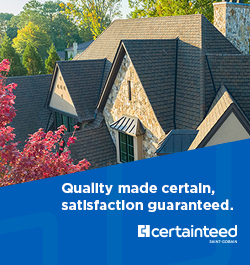










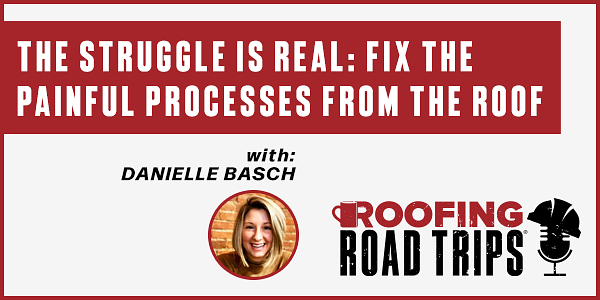
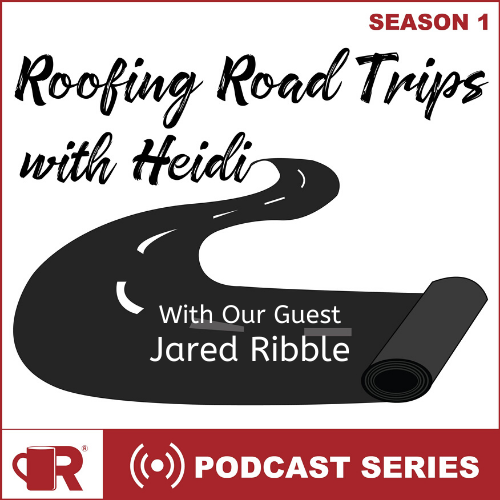
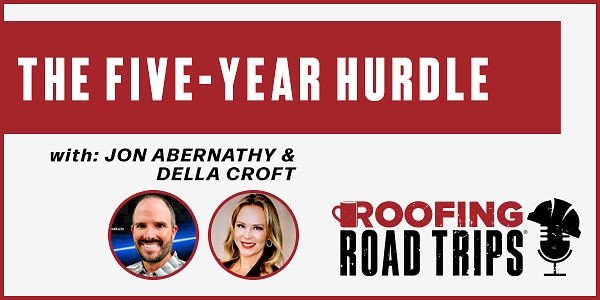



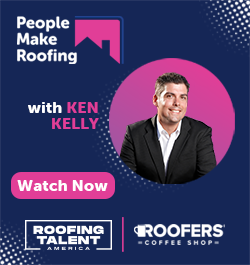

Comments
Leave a Reply
Have an account? Login to leave a comment!
Sign In